Baptised With Fire: First to arrive, last to leave
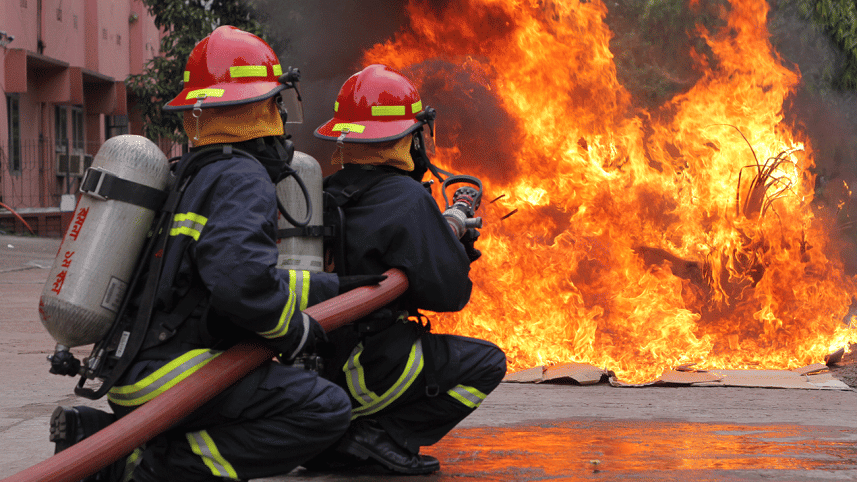
Photo courtesy: Media Wing, Bangladesh Fire Service and Civil Defence
April 24, 2013.
Bangladesh faced a national crisis when an eight-story building called Rana Plaza housing several garment factories collapsed to the ground, leaving a huge pile of rubble and thousands of lives trapped underneath. It was the deadliest building collapse in modern human history that shook the nation to its core. Just minutes after the collapse, the first rescuers who rushed to the spot, were the valiant men of the Bangladesh Fire Service and Civil Defence (BFSCD). And after twenty days of round the clock, systematic rescue, these men were the last to leave the site rescuing two thousand and five hundred trapped people from one of the world's biggest and most complex ruined structures.
During any disaster, whether fire, accidents of any kind road, railway or water transport, emergency rescue, the first people we call are the fire fighters of BFSCD. With five hundred and forty nine stations all over the country, these men have been providing all kinds of emergency service to the people whenever they are summoned. Besides, their community awareness programmes including fire fighting, rescue and evacuation drills have been making Bangladeshis a nation skilled in life saving activities and raising a constant army of dedicated volunteers.
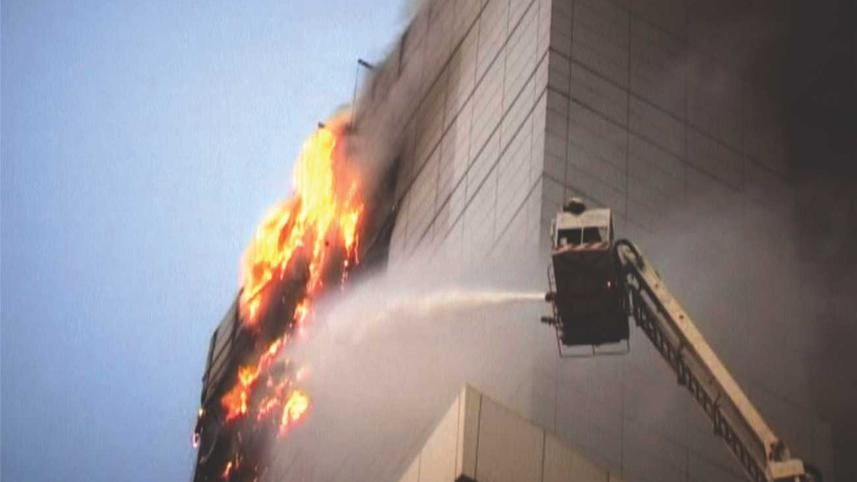
In 1982, BFSCD was formed unifying three separate departments such as Fire Service Department, Civil Defence Department and Rescue Department under Roads and Highways Division. From a skeleton division mainly focused on fire fighting, today this organisation can boast of an army of highly trained and experienced fire fighters, rescue experts, divers and a convoy of some of the most modern equipment and vehicles. In addition, their innovations, expertise to mobilise and utilise local resources have enabled them to efficiently tackle many of the deadliest and most difficult crises.
At present, this organisation has been procuring a wide range of modern fire fighting and rescue equipment. Snorkel fire trucks to rescue trapped people in the high altitude, chemical tenders to reduce fire originated from highly explosive chemicals often used in the industries, cold cut systems to dig through any obstacle without causing any flame, using water mist instead of water to control fire, heat resistant clothing and their own well equipped ambulance services have increased their professionalism and capacity.
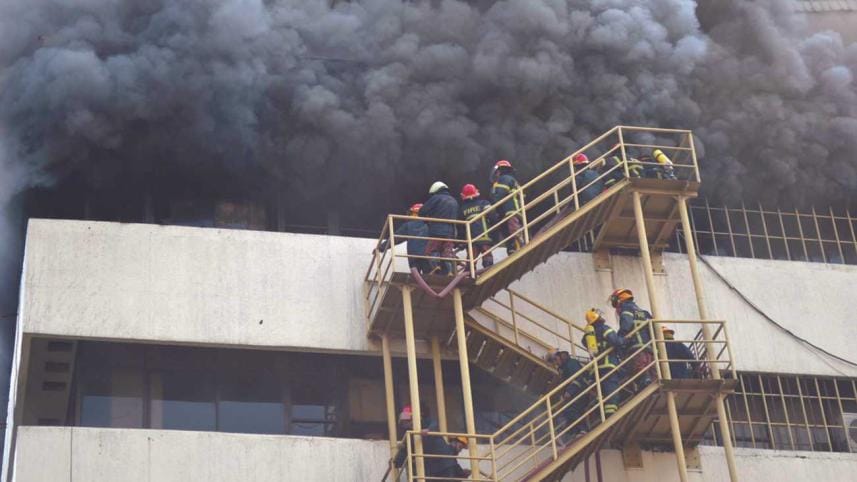
However, in Dhaka, a city overpopulated with 7 million people and criss-crossed by a network of narrow lanes and slums, all these cutting edge technologies sometimes prove to be futile. On June 3, 2010, when a fire sparked from the explosion of an electrical transformer reached the nearby illegal chemical warehouses, several residential buildings of old Dhaka's Nimtoli area set ablaze violently. Due to narrow lanes and huge crowd of onlookers surrounding the site, heavy fire fighting and rescue vehicles faced extreme difficulty to reach the spot in time. The consequence was horrific. One hundred and twenty six people were burnt to death and Bangladesh observed a national mourning day on June 5, 2010.
"That tragic incident was an enormous lesson for us. Soon after that, we innovated a way to tackle such situations. We raised a troop of advanced party to clear the crowd and to do the primary and immediate fire fighting. Heavy motor cycles have been procured and we have equipped those with tanks of water mist and water cannon," says Muhammad Mamun, senior staff officer of BFSCD.
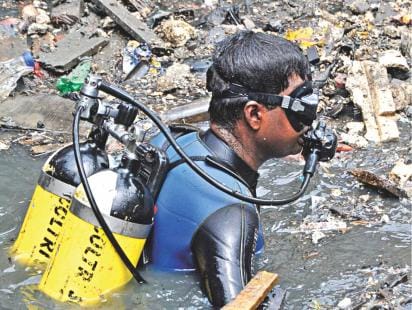
"During any such case like the Nimtoli tragedy, we send this advanced party on motorbikes, who quickly reach the spot, make way for our heavy vehicles and also start the fire fighting with their own equipment," he adds.
Nonetheless, another main challenge that they face to rescue trapped people is the flawed construction design. According to Mamun, "In the Tazreen Fashions incident we faced the worst consequence of flawed construction design. When every building's fire escape is supposed to take the escaping people out of the building compound, that factory's fire escape ended in front of the factory gate which was locked and there was no one with the key to open it."
"As a result, many people died simply from panic, suffocation and from being trampled on by their co-workers," he adds.
Then, to rescue people from such an adverse situation, the division has raised a troop of specialised force of rescuers and divers who have been dispersed all over the country. These special rescuers have been trained to penetrate through blazing fire with their heat resistant clothing and climb through high walls, barbed wires and any physical obstacles to free trapped people.

The divers are some of the most experienced and tested rescuers of BFSCD. During any water-related accidents, they have to dive under harsh conditions and rescue bodies from deep, troubled waters of Bangladesh's mighty rivers. Md Siddiqur Rahman, a veteran diver working for 18 years says, "To rescue people we are trained to dive anywhere; sea, river or even under the sewerage lines. However, our inland water vessels are so ramshackle, that by the time we reach the accident spot, most of the times we only have to rescue dead bodies from sunken vessels and return them to their families." "It is at the same time a difficult, rewarding but also very saddening job," he adds.
To reduce casualty and to tackle large scale crises, BFSCD has put more emphasis on volunteer training and raising community awareness. Brigadier General Ali Ahmed Khan, director general of BFSCD says, "Dhaka is an extremely unplanned metropolitan city, and this increases the risk of accidents and creates difficult situations for rescuers. There is no separate route for emergency vehicles which is a must for a densely populated city like Dhaka. Many people do not abide by the building codes and to save money, the builders install cheap or no fire extinguisher at all."
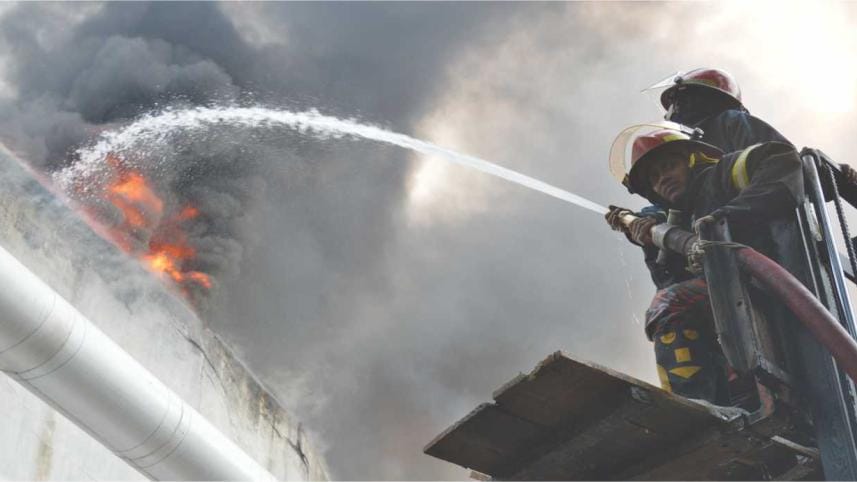
"Bangladesh Fire Service and Civil Defence is ready to tackle any emergency. We are also providing volunteer training and continuously arranging drills and exercises. But I would like to appeal to all, especially the city dwellers who live in multi-storeyed buildings to arrange their own fire drills at least to know how to operate domestic fire extinguisher and how to evacuate systematically. These trainings can save many lives during crises and can also prevent large scale disasters," he adds.
Although BFSCD has experienced fire fighters and advanced equipment, its manpower is too scarce to ensure adequate service in time of national disasters. With a workforce consisting of only 8000 members, it has to conduct all kinds of rescue and fire fighting operations all over the country. At present, in most of the upazilas there is no fire fighting unit at all although the process of deploying fire fighting units in all of them has already begun. Such shortage of manpower decreases the capacity of this organisation to enforce Fire Prevention Act-2003 which is also one of their important responsibilities. From 2011 to 2015, mobile courts of BFSCD filed only fifteen cases against the industries and shopping malls for not abiding the law. Again, if a major earthquake hits Dhaka and result in several building collapse and fire incidents at a time, there is no doubt that rescue and fire fighting capacity of BFSCD will be under intense challenge.
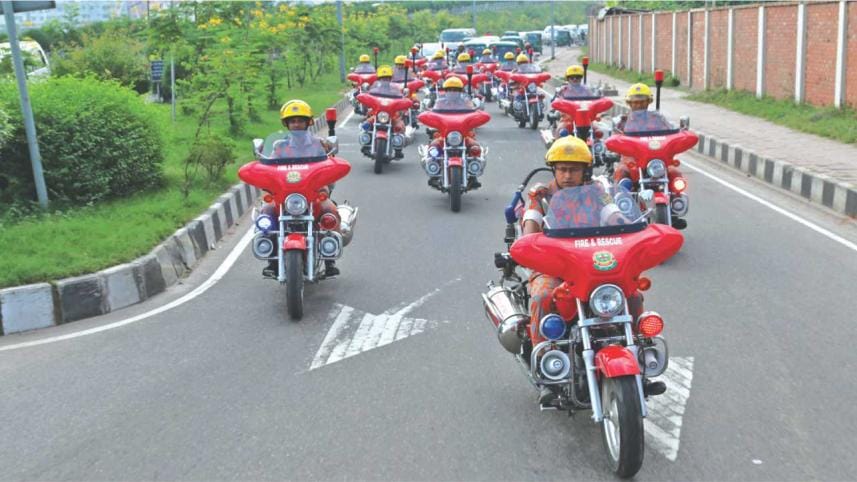
With limited manpower and budget, valiant men of the Bangladesh Fire Service and Civil Defence have been doing a tremendous job. However, it is certain that these people are overcommitted and that can affect their quality of service. And, during large scale crises, their manpower is not at all enough to ensure sufficient service to the nation. However, their skill and dedication is the proof that if properly supplied with manpower and material, this organisation can be the most important life saving force of our country and this is what our government must stress upon in the days to come.
- BFSCD organises regular volunteer training. Anyone can apply for such training by contacting at 02- 9555555/ ex-285.
- To interact with citizens online, BFSCD runs its own facebook page which can be reached at www.facebook.com/fscd.bd
- BFSCD's ambulance service is also available 24/7 days and can be availed by calling to the nearest fire service station or to the central control room
- BFSCD's central control room can be contacted at: 02-9555555, 02-9556666, 02-9556667, 02-9551300, 01730-336699, 01713-038181-2
Contact of Divisional Control Rooms of Fire Service
- Chittagong Control Room: 031-716326-7, 031-2521152-3, 01730-336666
- Rajshahi Control Room: 0721-774224, 01721-774293, 01730-336655
- Khulna Control Room: 041-760333-5, 01730-336677
- Sylhet Control Room: 0821-727976, 01730-336644
- Barisal Control Room: 0431-2177012-5
- Rangpur Control Room: 0521-56001, 01732-707172

 For all latest news, follow The Daily Star's Google News channel.
For all latest news, follow The Daily Star's Google News channel.
Comments